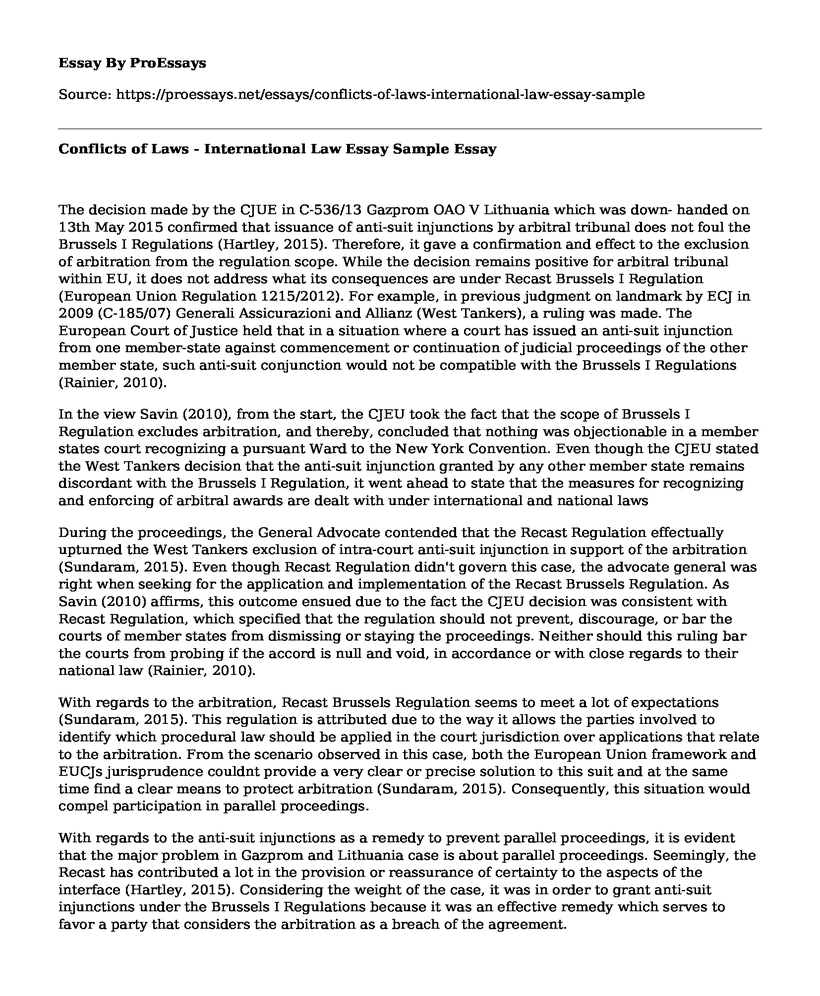The decision made by the CJUE in C-536/13 Gazprom OAO V Lithuania which was down- handed on 13th May 2015 confirmed that issuance of anti-suit injunctions by arbitral tribunal does not foul the Brussels I Regulations (Hartley, 2015). Therefore, it gave a confirmation and effect to the exclusion of arbitration from the regulation scope. While the decision remains positive for arbitral tribunal within EU, it does not address what its consequences are under Recast Brussels I Regulation (European Union Regulation 1215/2012). For example, in previous judgment on landmark by ECJ in 2009 (C-185/07) Generali Assicurazioni and Allianz (West Tankers), a ruling was made. The European Court of Justice held that in a situation where a court has issued an anti-suit injunction from one member-state against commencement or continuation of judicial proceedings of the other member state, such anti-suit conjunction would not be compatible with the Brussels I Regulations (Rainier, 2010).
In the view Savin (2010), from the start, the CJEU took the fact that the scope of Brussels I Regulation excludes arbitration, and thereby, concluded that nothing was objectionable in a member states court recognizing a pursuant Ward to the New York Convention. Even though the CJEU stated the West Tankers decision that the anti-suit injunction granted by any other member state remains discordant with the Brussels I Regulation, it went ahead to state that the measures for recognizing and enforcing of arbitral awards are dealt with under international and national laws
During the proceedings, the General Advocate contended that the Recast Regulation effectually upturned the West Tankers exclusion of intra-court anti-suit injunction in support of the arbitration (Sundaram, 2015). Even though Recast Regulation didn't govern this case, the advocate general was right when seeking for the application and implementation of the Recast Brussels Regulation. As Savin (2010) affirms, this outcome ensued due to the fact the CJEU decision was consistent with Recast Regulation, which specified that the regulation should not prevent, discourage, or bar the courts of member states from dismissing or staying the proceedings. Neither should this ruling bar the courts from probing if the accord is null and void, in accordance or with close regards to their national law (Rainier, 2010).
With regards to the arbitration, Recast Brussels Regulation seems to meet a lot of expectations (Sundaram, 2015). This regulation is attributed due to the way it allows the parties involved to identify which procedural law should be applied in the court jurisdiction over applications that relate to the arbitration. From the scenario observed in this case, both the European Union framework and EUCJs jurisprudence couldnt provide a very clear or precise solution to this suit and at the same time find a clear means to protect arbitration (Sundaram, 2015). Consequently, this situation would compel participation in parallel proceedings.
With regards to the anti-suit injunctions as a remedy to prevent parallel proceedings, it is evident that the major problem in Gazprom and Lithuania case is about parallel proceedings. Seemingly, the Recast has contributed a lot in the provision or reassurance of certainty to the aspects of the interface (Hartley, 2015). Considering the weight of the case, it was in order to grant anti-suit injunctions under the Brussels I Regulations because it was an effective remedy which serves to favor a party that considers the arbitration as a breach of the agreement.
References
Hartley, T. C. (2015). Antisuit injunctions in support of Arbitration: West Tankers still afloat. The International and Comparative Law Quarterly, 64(4), 965.
Rainier, D. (2010). The impact of West Tankers on parties: Choice of a seat of arbitration. Cornell L Rev, 95, 431.
Savin, A. (2010). The Arbitration Exception and Protection of Arbitration Agreements in the EU.European Journal of Law, 23(5), 78-86.
Sundaram, J. (2015). Does the judgment of the CJEU in Gazprom bring about clarity on the grant of anti-suit injunctions under the Brussels I regulation? Denning LJ, 27, 303.
Cite this page
Conflicts of Laws - International Law Essay Sample. (2021, Jun 14). Retrieved from https://proessays.net/essays/conflicts-of-laws-international-law-essay-sample
If you are the original author of this essay and no longer wish to have it published on the ProEssays website, please click below to request its removal:
- Probable Cause and the Fourth Amendment Research
- Fictional Representations of Crime In TV Programs And Movies Greatly Influence What People Know About Crime
- Private Prisons are a Detriment to the Society Essay Example
- Legislative and Judicial Roles of the Supreme Court - Essay Sample
- Essay Sample on Boeing Credit Card Fraud
- Essay Example on Charges Against Epstein: Prosecutor Consultant Demands
- Prison Standards Transformed: From Congestion and Torture to Rights and Freedoms - Essay Sample







